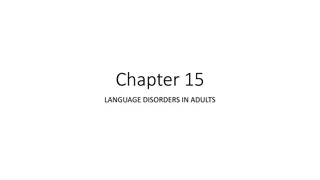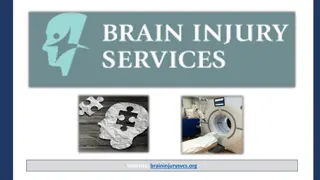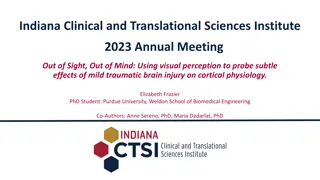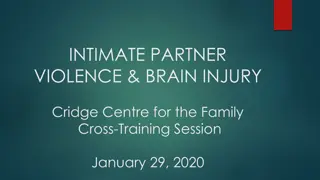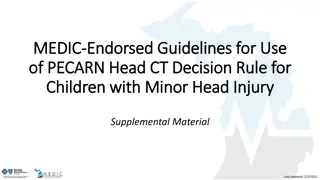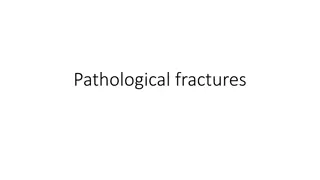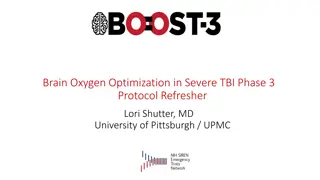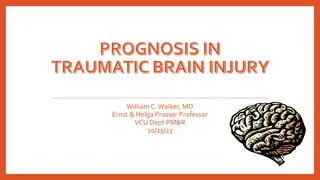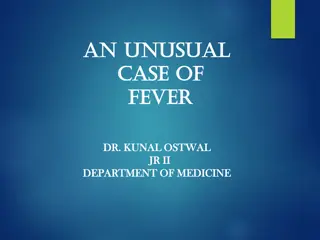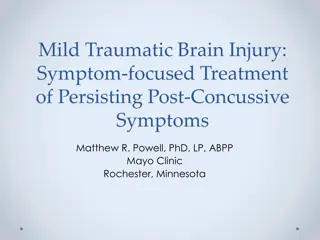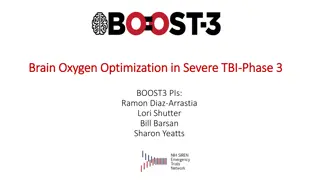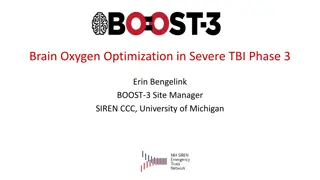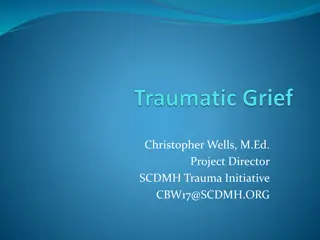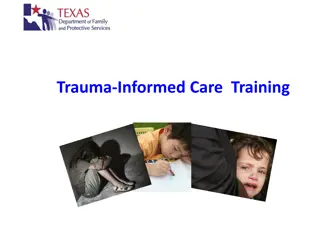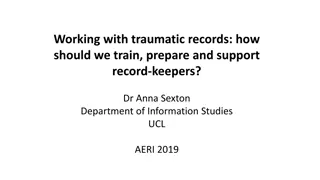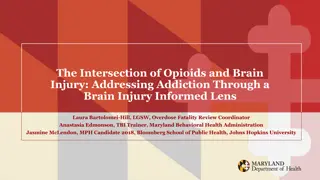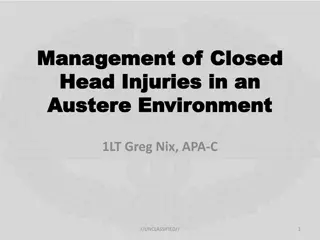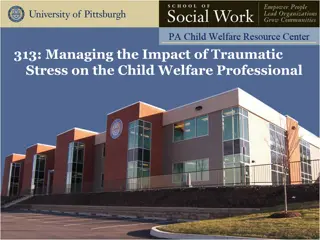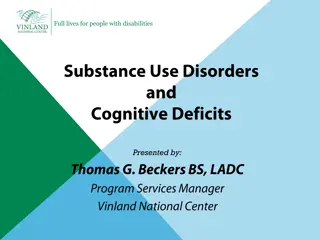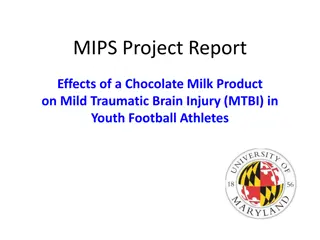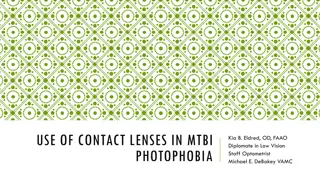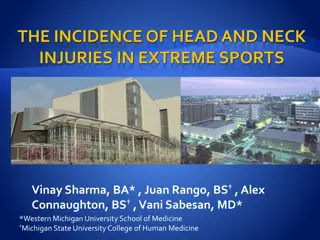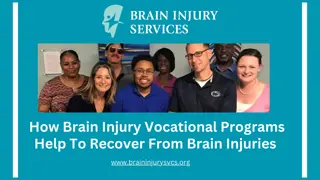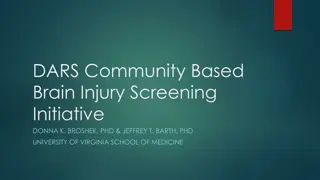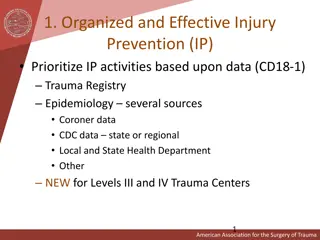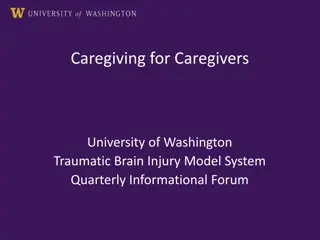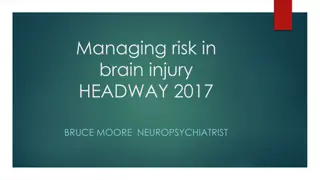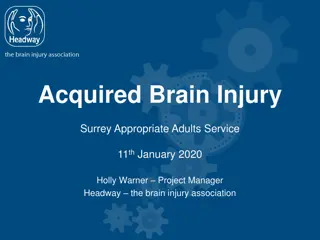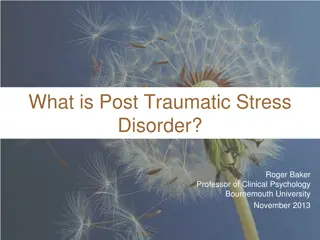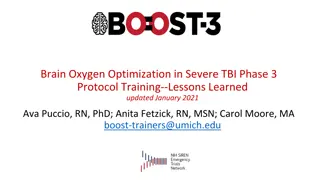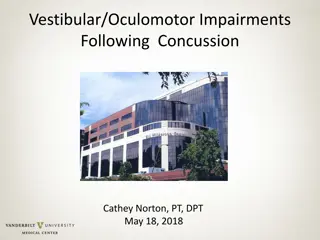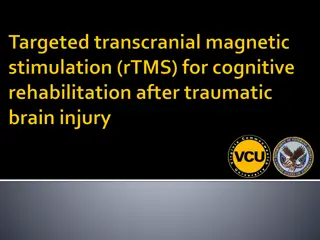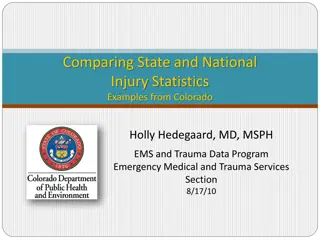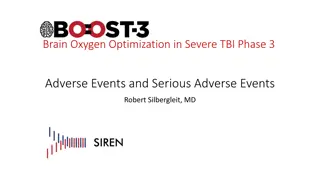Mild Steel SS400 Plates, MS High Tensile SS400 Sheet Supplier
Rexton Steel & Alloys is the largest manufacturer and suppliers of Mild Steel SS400 Perforated Sheets, Steel Mild Steel SS400 Plates, Mild Steel SS400 Ship Building Steel Plates Supplier in Mumbai, India
6 views • 7 slides
Understanding Neurogenic Speech and Language Disorders in Adults
This chapter provides insight into language disorders in adults, including types of aphasia, causes such as toxins, traumatic brain injury, brain tumors, and strokes. It discusses cerebral hemorrhage, occlusive strokes, ischemic stroke, transient ischemic attacks, and cerebral thrombosis. The conten
1 views • 34 slides
Brain Injury Services: Empowering Recovery and Support
At Brain Injury Services, we are committed to making a positive difference in the lives of individuals affected by brain injury. Through our comprehensive support services, compassionate care, and commitment to empowerment, we empower survivors to overcome obstacles, reclaim their independence, and
7 views • 7 slides
Mild Steel SS400 Plates
Rexton Steel & Alloys is the largest manufacturer and suppliers of Mild Steel SS400 Perforated Sheets, Steel Mild Steel SS400 Plates, Mild Steel SS400 Ship Building Steel Plates Supplier in Mumbai, India
2 views • 7 slides
Investigating Visual Perception Effects of Mild Traumatic Brain Injury
Elizabeth Frazier, a PhD student at Purdue University, explores the subtle effects of mild traumatic brain injury (mTBI) on cortical physiology using a novel two-alternative forced choice task in mice. The study aims to bridge visual deficits and cortical circuitry changes post-mTBI to improve diagn
0 views • 5 slides
Understanding Intimate Partner Violence and Brain Injury Connections
The link between intimate partner violence (IPV) and brain injury is significant, with studies showing a high prevalence of brain injuries among IPV survivors, particularly women. Common types of IPV causing brain injury include hits to the head, strangulation, and banging the head against objects.
1 views • 23 slides
Guidelines for PECARN Head CT Decision Rule in Children with Minor Head Injury
Michigan Emergency Department Improvement Collaborative (MEDIC) endorses the PECARN Head CT Decision Rule for children with minor head injury to standardize and reduce overuse of CT scans. This rule, developed and vetted by experts, aims to improve clinical decision-making, reduce costs, radiation e
4 views • 11 slides
Understanding Fractures: Traumatic vs. Pathological and Modeling Options
Defining the distinction between traumatic and pathological fractures, exploring the relationship between non-traumatic fractures and underlying bone pathologies, and discussing modeling options for classifying fractures. Stress fractures, insufficiency fractures, and the causes of pathological frac
4 views • 8 slides
Brain Oxygen Optimization in Severe TBI - Protocol Summary
In the severe traumatic brain injury (TBI) protocol, intracranial monitors measuring ICP and PbtO2 are placed within 12 hours of injury. Procedures include FiO2 challenges to check PbtO2 reliability and assess cerebral physiology. Challenges involving FiO2, MAP, and CO2 help guide ventilator setting
2 views • 27 slides
Understanding Prognosis in Traumatic Brain Injury
Prognosis in traumatic brain injury is influenced by various factors such as population characteristics, impairment levels, and time frames. Predicting short-term and long-term outcomes is crucial for effective patient care, financial planning, and resource utilization. Common outcome measures inclu
0 views • 46 slides
Unusual Case of Fever with Gastrointestinal Symptoms in a 22-Year-Old Patient
A 22-year-old male from Pune presents with high-grade fever, chills, myalgia, arthralgia, loose stools, and vomiting for 2 days. Past history is unremarkable, while the family history includes hypothyroidism in the mother and hypertension in the father. General examination reveals normal vital signs
0 views • 22 slides
Understanding Mild Traumatic Brain Injury and Treatment Options
Exploring the pathophysiology and clinical recovery of mild traumatic brain injury (mTBI), along with the risk factors for persisting post-concussive symptoms. The importance of diagnosing mTBI and the impact it has on individuals. Highlighting the neurometabolic cascade and functional injuries asso
0 views • 37 slides
Brain Oxygen Optimization in Severe Traumatic Brain Injury (BOOST3) Trials Overview
Overview of the BOOST3 trials focusing on brain oxygen optimization in severe traumatic brain injury patients. The trials involve multiple PIs, training sessions, and hands-on ancillary studies. Various design principles and organizational values are emphasized, with grant awards distributed to diff
0 views • 13 slides
Brain Oxygen Optimization in Severe TBI Phase 3: BOOST-3 Study Details at University of Michigan
Explore the BOOST-3 trial led by Erin Bengelink, focusing on brain oxygen optimization in severe Traumatic Brain Injury (TBI) Phase 3. Discover study materials, milestones, regulatory parameters, and training resources to facilitate your involvement in this crucial research project. Access the BOOST
1 views • 22 slides
Personal Injury and Compensation Claims Overview
Stewarts law firm focuses on serious injury claims, emphasizing a client-centered approach to personal injury litigation. This presentation aims to provide a basic understanding of compensation claims for serious injuries, the difference between clinical negligence and personal injury cases, and the
0 views • 20 slides
Understanding Traumatic Grief and Bereavement: A Comprehensive Overview
Explore the complexities of traumatic grief, bereavement, and loss through a detailed examination of definitions, theories, stages, symptoms, impact, and risk factors. Unpack the nuances of acute grief, integrated grief, and the coping mechanisms individuals utilize when faced with profound loss. Ga
1 views • 117 slides
Understanding Trauma-Informed Care Training
Trauma-Informed Care Training involves understanding child traumatic stress, recognizing the effects of trauma on child development, behaviors, and functioning, as well as preventing and coping with Compassion Fatigue. It emphasizes creating safety for both providers and survivors and empowering sur
0 views • 55 slides
Supporting Record-Keepers Dealing with Traumatic Records
Understanding the impact of traumatic experiences on record-keepers is crucial in training, preparing, and supporting them. Trauma, whether singular, ongoing, or complex, can be represented in records stored in archives. The potentiality of records to carry traumatic experiences requires a thoughtfu
0 views • 15 slides
The Intersection of Opioids and Brain Injury: Addressing Addiction Through a Brain Injury Informed Lens
Exploring the correlation between traumatic brain injury (TBI) and the opioid crisis, this content delves into the alarming statistics of opioid overdoses and their impact on individuals with brain injuries. Highlighting the overlap and consequences of these two major health issues, it sheds light o
0 views • 45 slides
Management of Closed Head Injuries in an Austere Environment Overview
Understanding the pathophysiology of brain injuries, including intracranial pressure changes and specific injuries such as traumatic brain injury (TBI), skull fractures, brain bleeds, and diffuse axonal injuries. It covers classifications, diagnosis, and treatment approaches for mild/concussion, mod
0 views • 27 slides
Managing Traumatic Stress in Child Welfare Professionals
Learn to identify, recognize, and manage traumatic stress as an occupational hazard in the child welfare profession. This program helps professionals assess the impact of traumatic stress and personal strengths, develop strategies to promote resiliency, and understand the importance of safety and cu
0 views • 30 slides
Full Lives for People with Disabilities - Addressing Traumatic Brain Injury
Traumatic Brain Injury (TBI) presents a significant public health concern in the United States, often termed as the silent epidemic due to its hidden nature. This condition affects thinking and memory, impacting individuals' lives profoundly. Resources such as "The Essential Brain Injury Guide" shed
0 views • 23 slides
Effects of Chocolate Milk on MTBI in Youth Football Athletes
Mild Traumatic Brain Injuries (MTBIs) are common in sports, especially youth football. This study investigates the potential benefits of a chocolate milk product, Fifth Quarter FreshTM, in aiding recovery from MTBIs among young athletes. Chocolate milk is known for its protein, carbohydrate, and ele
0 views • 43 slides
Understanding the Use of Contact Lenses in Photophobia Associated with mTBI
Photophobia in patients with mild traumatic brain injury (mTBI) can be debilitating, with up to 59% of military personnel reporting sensitivity to light after a TBI event. Contact lenses, sunfilters, and tinted glasses can help manage photophobia symptoms. Mechanisms underlying photophobia involve t
0 views • 10 slides
The Incidence of Head and Neck Injuries in Extreme Sports
Study on the prevalence of head and neck injuries in extreme sports, specifically focusing on concussions, a common type of brain injury. The research highlights the impact and risks associated with extreme sports activities, showcasing data on traumatic brain injuries and non-fatal incidents relate
0 views • 25 slides
How Brain Injury Vocational Programs Help To Recover From Brain Injuries
Brain Injury Services provide essential support for individuals recovering from brain injuries. By offering personalized counseling, rehabilitation programs, and vocational training, they empower clients to regain independence and enhance their quali
4 views • 7 slides
Community-Based Brain Injury Screening Initiative at University of Virginia School of Medicine
Screening for traumatic brain injury (TBI) is crucial for identifying individuals with chronic TBI symptoms that impact productivity and social integration. The initiative aims to develop a brief, easy-to-administer TBI screening measure to assist community health organizations in identifying and re
0 views • 13 slides
Cognitive and Behavioral Management Strategies for Traumatic Brain Injury Patients
This presentation focuses on addressing challenging cognitive, behavioral, and personality issues associated with traumatic brain injury (TBI). It outlines cognitive issues such as attention, speed of processing, learning, memory, and executive functioning. Cognitive management strategies include te
0 views • 18 slides
Effective Strategies for Injury Prevention in Trauma Centers
Organized and data-driven injury prevention activities are crucial in trauma centers. Community partnerships, evidence-based reviews, designated injury prevention coordinators, and involvement of trauma personnel are key elements for successful injury prevention. Targeting contributing factors like
0 views • 20 slides
Understanding Caregiving for Traumatic Brain Injury Survivors
Caregiving for individuals with Traumatic Brain Injury (TBI) is a crucial yet challenging role undertaken by family members or friends. The responsibilities can be overwhelming, impacting both the survivor and the caregiver's well-being. This presentation highlights the needs of caregivers, survivor
0 views • 22 slides
Managing Risk in Brain Injury: Strategies and Considerations
This informative content covers essential aspects of risk management in brain injury, including balancing client needs, promoting independence, and positive risk taking. It delves into the different parts of the brain, their functions, and the potential effects of brain injury on intellectual, behav
0 views • 14 slides
Understanding Acquired Brain Injury: Facts, Challenges, and Stories
Acquired Brain Injury (ABI) is a complex condition that encompasses various causes such as traumatic brain injury, stroke, brain aneurysm, and more. This type of injury can lead to cognitive, physical, and communication difficulties, impacting individuals in profound ways. Survivors of ABI may face
2 views • 24 slides
The Relationship Between Cognitive Flexibility and Psychological Flexibility After Acquired Brain Injury
This study explores how cognitive flexibility and psychological flexibility interact after an acquired brain injury. It examines whether individuals who exhibit cognitive inflexibility can achieve psychological flexibility, considering the impact of cognitive impairments post-injury. Cognitive flexi
0 views • 21 slides
Understanding Post-Traumatic Stress Disorder (PTSD) and Trauma
Post-Traumatic Stress Disorder (PTSD) is a psychological condition that may develop after a person experiences a traumatic event. Trauma can result from various incidents such as accidents, natural disasters, abuse, or war, leading to personal reactions and challenges in one's perceptions. Victims o
0 views • 104 slides
Lessons Learned in Brain Oxygen Optimization for Severe TBI Phase 3 Protocol
Screening, enrollment, and inclusion/exclusion criteria insights for the Brain Oxygen Optimization in Severe Traumatic Brain Injury (TBI) Phase 3 Protocol are discussed. Key points include handling urgent patient queries, guidelines on hypotension and hypoxia, pupil assessment considerations, and su
0 views • 20 slides
Understanding Vestibular and Oculomotor Impairments Post-Concussion
This presentation discusses common vestibular and oculomotor impairments following a concussion, highlighting the importance of the Vestibular/Ocular Motor Screening Assessment in identifying and monitoring concussions. It covers evaluation techniques for the vestibular system, interventions for ocu
0 views • 69 slides
Exploring Computational Theories of Brain Function
In this series of images and text snippets, the discussion revolves around the emerging field of computational theories of brain function. Various aspects such as symbolic memories, the relationship between the brain and computation, the emergence of the mind from the brain, and computational thinki
0 views • 53 slides
Cognitive Deficits and Treatment Options Following Traumatic Brain Injury
Traumatic Brain Injury (TBI) can lead to a range of cognitive deficits and long-term complications, affecting communication, sensory perception, behavior, and more. Severe TBI is associated with EEG frequency shifts and cognitive impairments similar to Alzheimer's disease and schizophrenia. While tr
0 views • 34 slides
Comparative Analysis of Injury Statistics Between Colorado and National Data
This study compares injury statistics between Colorado and national data, focusing on injury deaths, hospitalizations, and diagnosis codes. The purpose is to analyze NHDS and HCUPNet data for national estimates, highlighting differences in hospital discharges for various injury categories. The analy
0 views • 13 slides
Brain Oxygen Optimization in Severe TBI: Adverse Events Analysis
This study led by Dr. Robert Silbergleit focuses on adverse events in brain oxygen optimization for severe Traumatic Brain Injury (TBI) patients. It outlines key points for reporting adverse events, discusses relatedness algorithms, and presents scenarios to analyze adverse events occurrence post-en
0 views • 24 slides

